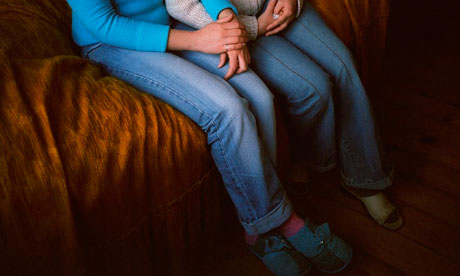
'In spite of the diversity of this forced labour there is an underlying constellation of factors including poverty, social exclusion and government inaction that results in vulnerable people becoming enslaved.' Photograph: Karen Robinson
We live under the comforting delusion that slavery is a thing of the past. And yet the International Labour Organisation estimates that there are a minimum of 12.3 million people in forced labour in the world today. This problem afflicts every part of the world – including the UK.
The plight of vulnerable foreign workers trafficked to the UK for forced labour and sexual exploitation is relatively well known. Less well known, until a BBC investigation this week, is the plight of vulnerable British workers who have been trafficked to other parts of mainland Europe for forced labour.
Regular readers of the Guardian may have seen fine work by Felicity Lawrence, Pete Pattisson and Mark Townsend that has highlighted some of the problem across the world, such as the trafficking of vulnerable migrants for domestic servitude in the Middle East, or forced agricultural labour in Spain. Yet in spite of the diversity of this forced labour there is an underlying constellation of factors including poverty, social exclusion and government inaction that results in vulnerable people becoming enslaved.
The issue remains at the margins of political and developmental concerns: there was, for example, no UN Millennium Development Goal on eradication or reduction of slavery. And any progress towards the current Millennium Development Goals could be achieved without affecting the life of a single slave, who are too often excluded from anti-poverty measures such as schools, water, and even famine relief, because of prejudices and divisions that often exist in poor communities.
Neither is slavery and human trafficking adequately treated in domestic policy and practice in the UK. In 2009 the Anti-Trafficking Monitoring Group declared British anti-trafficking policy not fit for purpose and – in crucial areas – at odds with the most basic tenets of the rule of law.
For example, in the aftermath of police raids on cannabis factories up and down the country, many of the "gardeners" found in the factories, including children, have been prosecuted and later deported – in spite of evidence that they were in fact enslaved to do the work. They have been doubly victimised: first by those who trafficked them and then by those who had the responsibility to protect them. The recent report, Landing in Dover, by the Children's Commissioner for England, highlights the cases of seven Vietnamese children, trafficked into Britain to work as "gardeners" in cannabis factories in 2010, who were sent back to France when they were discovered. Social services said they were told nothing about it.
The report also found that as early as 1995, trafficked children arriving alone at Dover were sent back to France under a bilateral "gentleman's agreement" between the UK and France, if they did not claim asylum within 24 hours. It was found that this agreement was in force at all Channel ports. These children were often hungry, ill, exhausted and distressed with no access to social services or child protection staff.
This agreement in respect of children came to an end as late as November 2011, when the practice became apparent to the children's commissioner. However, adults who come to UK through channel ports and show signs of trafficking, but who don't claim asylum within 24 hours, could still be returned to France without undergoing any sort of risk assessment.
The British government has also mooted removing the right of domestic workers to change employers, trusting their protection from abuse to the dysfunctional anti-trafficking system. The implications of this proposal, if enacted, would mean that if domestic workers were to leave abusive employers they could be deported. Such a change in regulation would have the effect of the government facilitating trafficking for forced domestic work.
While there are indications that the police and Gangmasters Licensing Authority have begun to investigate the sort of abuses uncovered by the BBC, the government response suggests it is unable to compute the implications.
The basic assumption of this policy is that trafficking relates only to foreigners transgressing immigration law. Yet the flaws in this approach have been exposed by the BBC investigation showing vulnerable Britons being trafficked to mainland Europe.
The government's inability to formulate a coherent and effective anti-trafficking strategy means we need an independent anti-trafficking monitoring body accountable to parliament. This would provide evidence-based advice to government on effective anti-trafficking measures across government and to prevent policy from being hijacked by a narrow and unhelpful anti-immigration agenda.

No comments:
Post a Comment